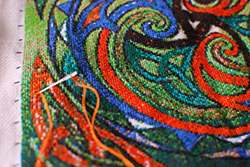Process
Submitted by RickBanghart on
Process/product. Even a relatively small project of mine takes two or three months from start to finish. There is a brief beginning portion, then a very long middle portion followed by another brief ending portion.
The beginning is where I am now (8/22/18) in my current work (which shall remain nameless until the guessing game is over). During the beginning phase I have to count carefully to place the first stitches. Their location becomes a reference for future stitches, so I am especially careful because I know how an error ripples into the future.
